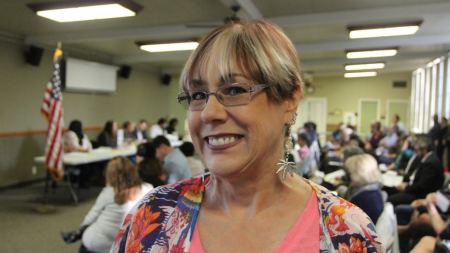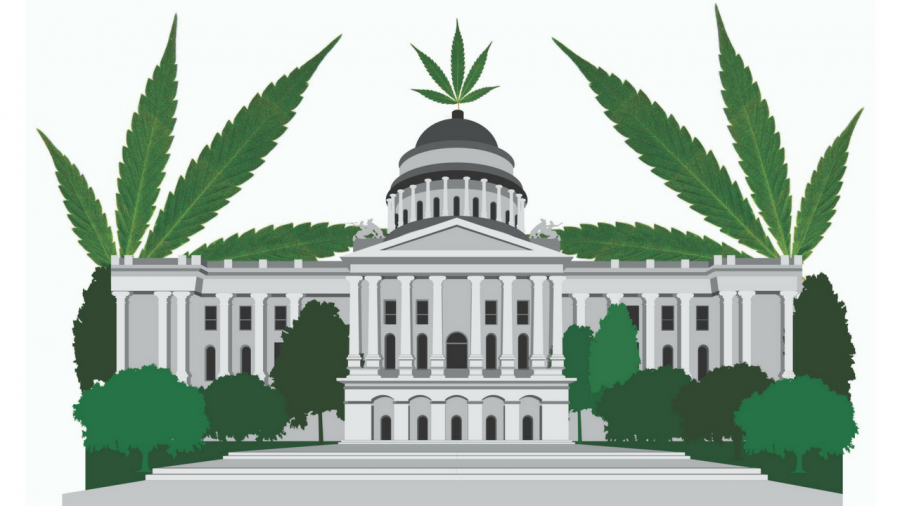The passage of Proposition 64 in November has made the legal distinctions surrounding cannabis even more complex, although use and possession remain against Sacramento State policy.
Though use and possession of marijuana remains illegal under federal law, it is now legal in California for anyone over the age of 21 to use it and possess up to 28.5 grams (but only 8 concentrated grams) of marijuana. It is still illegal to smoke it in public places and where tobacco smoking is restricted.
Sac State Chief of Police Mark Iwasa said that his department receives calls about people smoking marijuana on campus “about eight times a year,” and that the volume hasn’t changed since Proposition 64 was passed.
Iwasa said that use and possession of marijuana on campus remains against school policy in spite of Proposition 64, but that penalties are different depending on the age of the suspected offender and the discretion of the officer.
“Students and faculty are still regulated under that policy. Even if the criminal charges aren’t taken, administrative discipline is the remedy there,” Iwasa said. “If someone violates the policy, they can be asked to leave campus.”
People under the age of 21 are still violating the law and can be cited. The penalty for those between the ages of 18 and 21 is a fine of up to $100. The penalty for those under 18 is drug counselling and community service.
“When there are people under the age of 21, we deal with that the same way we always dealt with it,” Iwasa said.
Housing and Residential Life bans the use and possession of marijuana in the residence halls — even when it’s medically prescribed. Drug paraphernalia is also prohibited.
“There’s a lot of precautions you take. You put a towel down at the door and open the window. There’s a handheld device you can make with a sheet and a toilet paper roll.” — Sac State student, who wished to remain anonymous, who smoked marijuana in the residence halls
The policy, which has not changed since the passage of Proposition 64, stipulates that the offender must undergo housing probation, a class and the completion of an online assessment called e-THC Online Knowledge Experience (e-TOKE). The second offense can lead to possible relocation from the hall, and the third offense will lead to expulsion from the residence halls.
A Sac State student who wished to remain anonymous for fear of repercussions hid his medicinal cannabis in his room when he lived on campus.
He said that students who smoked marijuana in the residence halls often successfully concealed the smell of smoke.
“There’s a lot of precautions you take,” he said. “You put a towel down at the door and open the window. There’s a handheld device you can make with a sheet and a toilet paper roll.”
While he never got caught smoking, some of his friends did.
“I had a friend who got kicked out of the dorms because of it,” he said.
The student said that he smokes marijuana to help him deal with anxiety, but added that he doesn’t think it’s for everyone.
“I work out, I’m active, I also smoke every day,” he said. “I haven’t found it as any type of inhibition if you can figure out moderation. You can’t be stupid or you’ll go down real quick.”
While personal growth and use are now legal everywhere in the state, commercial growth and sales can be limited by local governments. This has led to a lack of uniformity in the laws throughout Sacramento County.
For example, while there are 30 cannabis dispensaries in the city of Sacramento (where Sac State is located), the Sacramento County Board of Supervisors voted April 12 to restrict commercial sales, delivery and growth in unincorporated Sacramento.
Rancho Cordova, Folsom, Citrus Heights and Elk Grove have similar restrictions. (Story continues below)

Marcia Blount, the president of the Brownie Mary Democratic Club of Sacramento County, is working on lobbying lawmakers for further liberalization in the laws.
“The mission for the Brownie Mary Democrats is that we want to end the war on drugs,” Blount said. “We want people treated by the public health system if they have a problem and left alone if they don’t. This stuff about ‘the first hit makes you an addict’ is silly nonsense.”
Blount said that last year’s endorsement of legalization in the state’s Democratic platform has helped legalization advocates because Democrats hold a legislative supermajority and all statewide elected offices.
“It makes it so much easier to say to a politician, ‘You know, your party supports this,’ ” Blount said. “Sometimes they say ‘I don’t care’ — but they’ll listen.”
At next month’s state Democratic convention in Sacramento, Blount and other activists will present a resolution which would endorse a new statewide policy “that stops state and local police from cooperating with federal law enforcement.”
Because Proposition 64 left so much up to the State Legislature, there are dozens of bills in the Assembly and Senate that would affect the legal status of cannabis.
Governor Jerry Brown’s office has crafted proposals intended for the legislature to adopt which streamline the regulations surrounding medical and recreational use.
Some lawmakers have criticized Brown’s proposals as being too lenient on marijuana distributors, saying that it waters down 2015 rules regulating medical marijuana.
For example, one proposal would eliminate the requirement that marijuana growers don’t sell the product themselves, which was passed in 2015 with the intention of preventing cannabis businesses from getting too large.”
Blount said that one reason to keep medical and recreational regulations separate is because while President Donald Trump said in February 2016 that he supports medical marijuana, the Justice Department signaled that a federal crackdown on recreational use may be coming.


























































































































